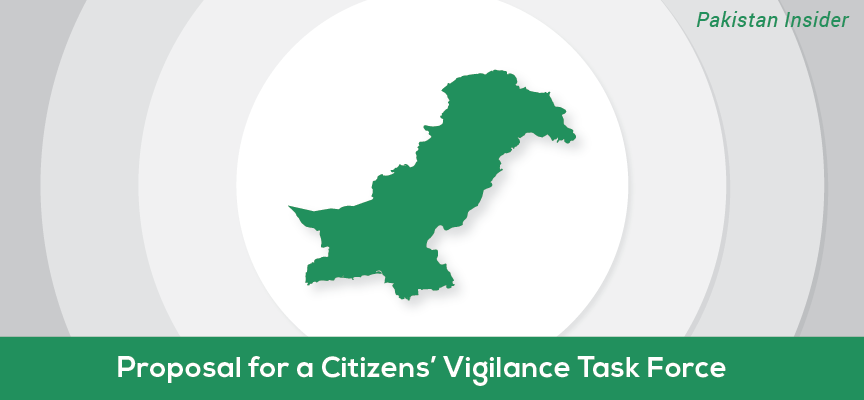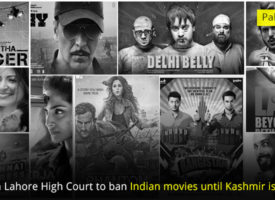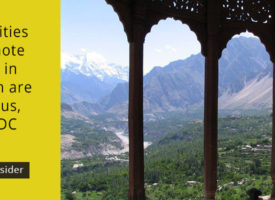In developed countries, law enforcement agencies and citizens who are mindful of their social obligations form liaison committees to share useful information with each other; especially during investigations. In Pakistan, the most famous example quoted in the media is that of Citizens Police Liaison Committee (CPLC) in Karachi. Unfortunately, this forum became heavily politicized by a certain political party which is known to have militant leanings. Its presence in just one city further makes it a non-adaptable model for replication elsewhere.
While Pakistan has yet to reach the minimum requirements to barely be considered a developing country, its turbulent law and order (wartime woes) demands the establishment of a task force to keep an eye on suspicious individuals, groups and their activities.
I propose naming this suggested forum “Citizens’ Vigilance Task Force (CVTF)”. As the name suggests, it will be responsible for maintaining vigilance in and around cities, where majority of terrorist incidents take place.
Functions and Organogram
CVTF will be mandated to spread its network across towns, neighborhoods uptil alleys. It will have a Central Office in the federal capital Islamabad with regional offices in Quetta, Lahore, Karachi, Peshawar, Muzaffarabad and Gilgit (possibly a few more). Further downwards, these provincial/zonal offices will have City Committees in large cities across their respective provinces. For example, Regional Office (Lahore) will oversee operations of Multan, Bahawalpur, Sialkot, Okara, etc as part of the Punjab province.
CVTF will be an autonomous task force by the citizens, for the citizens. A process will be developed whereby heads of City Committees, Regional Offices and the Central Office will be nominated through a public, network-wide and apolitical electoral process. Educated, law-abiding and apolitical citizens aged between 25 and 35 will be part of the network offices; similarly, an educated and widely-respected member of the civil society aged somewhere between 40 and 50 will be appointed as the Chief of CVTF for a tenure of 3 years.
He will be the de facto Chairman of a Review Committee, comprising of at least 5 members:
1) A senior retired PSP officer
2) A senior retired ISI officer
3) An official from the Ministry of Civil Defence (serving)
4) Coordinator NACTA (serving)
5) Two acclaimed security analysts
City Committees
Each City Committee will generate and forward weekly sitreps to its Regional Office. These sitreps will contain statistical-cum-visual information about prominent occurrences in various towns, neighborhoods, including information about suspected individuals; especially those who have never lived in the area before. So for example, the City Committee in Lahore (adjacent to the Regional Office for the entire province in the same city) will gather weekly-updated information from towns/zones such as Allama Iqbal Town, Sabzazar, Gulberg, Icchra, Samanabad, etc. Each city will be responsible to accurately compile, summarize and distribute weekly sitreps (containing weekly “gali-mohalla intelligence”) onwards to their Regional Office. City Committees will be headed by a City Head with a team of citizens representing each town in their area of responsibility.
Regional Offices
Each of the regional offices will maintain an archived record of these weekly sitreps from each city and share a Monthly Summary (fused and further summarized information for concise reading) with the Central Office in Islamabad i.e. the hub of all CVTF activities and decision-making. There, the Review Committee will analyze reports from each Regional Office, after which the CVTF will present copies of its final report to the Ministry of Interior, Ministry of Defence and Home Departments in each province.
Information Sharing Mechanism
Since CVTF’s weekly and monthly sitreps will be of a highly-sensitive nature, serious security measures will have to be put in place to ensure information does not fall into undesirable hands. In this regard, the best, most secure and trustworthy means of forwarding information from zonal to city, further to regional offices and the Central Office, is through a special courier service; this tailored service will provide dedicated postal and courier services for timely communication within the CVTF network and between government bodies.
Digitizing information or enabling sharing over the public Internet could pose severe Information Security risks. If miscreant/hostile elements get access to any such file, God forbid, the consequences could be severely damaging.
Files (sitreps, other correspondences) will not contain names of the senders/receivers. Instead, their initials will be mentioned to maintain personal security and protect identities of certain sources.
CVTF will recruit sources from every neighborhood and community society in their jurisdiction. They will further gather information from a network of sources in educational institutions, shop owners, doctors, etc. Each CVTF City Head will appoint a Zonal Head (in each town/sector) who will be rewarded for exceptional performance, such as providing crucial intelligence of actionable/preventative value. Though City Heads will be publicly known, identities of their respective Zonal Heads will be kept strictly confidential to avoid undesirable attention and ensure smooth functioning of the information-collection process. In this way, the sources from whom Zonal Heads will collect data will freely share whatever information is casually asked from them.
This landmark model of “gali-mohalla intelligence” can prove most beneficial in urban areas. According to Worldometer, about 38% or approximately 71 million Pakistani citizens live in urban areas. Although this isn’t a sizable proportion, it is worth noting that major terrorist attacks take place in large cities and urban centres. In most cases, investigations have revealed that terrorist planners and masterminds behind various incidents actually lived in small premises rented out in some ghetto areas of cities. A considerable contribution can be made by CVTF Zonal Heads to keep record of any such dangerous immigrants.
How CVTF can fill the critical gap
The oft reported weakness in Pakistan’s national security apparatus is the lack of a synchronized intelligence setup. Each civil and military intelligence agency has the capability to gather a variety of critical intelligence; what is missing is the centralized system to fuse all this gathered information together into a unified picture for law-enforcement agencies. The long-proposed Joint Intelligence Directorate is far from realization. What the CVTF can do, in the capacity of a socially-responsible task force of patriotic civilians, is to help officials as far as information collection is concerned. Acting on this accumulated information will not be the CVTF’s responsibility, nor its mandate.
As a group of volunteers and hired professionals, CVTF will also conduct Citizen Awareness Workshops in educational and professional institutions across Pakistan. The Ministry of Civil Defence, a government organization which has been conspicuously dormant and practically ineffective since long, was supposed to do just the thing i.e. train civilians and make them aware of disaster and risk management incidents. In a somewhat similar and slightly different manner, the CVTF will educate citizens about how to detect suspicious individuals and report them to relevant authorities.
This is what vigilance is all about.
Conclusion
Pakistan is in a state of war. The imbalance in Civil-Military Relations keeps fluctuating with each passing day. Sometimes there is lack of political will and in others, there is lack of effectiveness in certain military operations. In such a scenario, certain members of the ordinary civil society can act as a bridge between the civilian government and military/intelligence organizations on issues of critical national security. These citizens can do their bit to help their protectors not just morally, but by actually lending them helping hands.








I fully agree with this task force.
Before it establish one must put a frame work, the selection modalities, some incentive for the people those who will be on board.
one had to be very realistic .